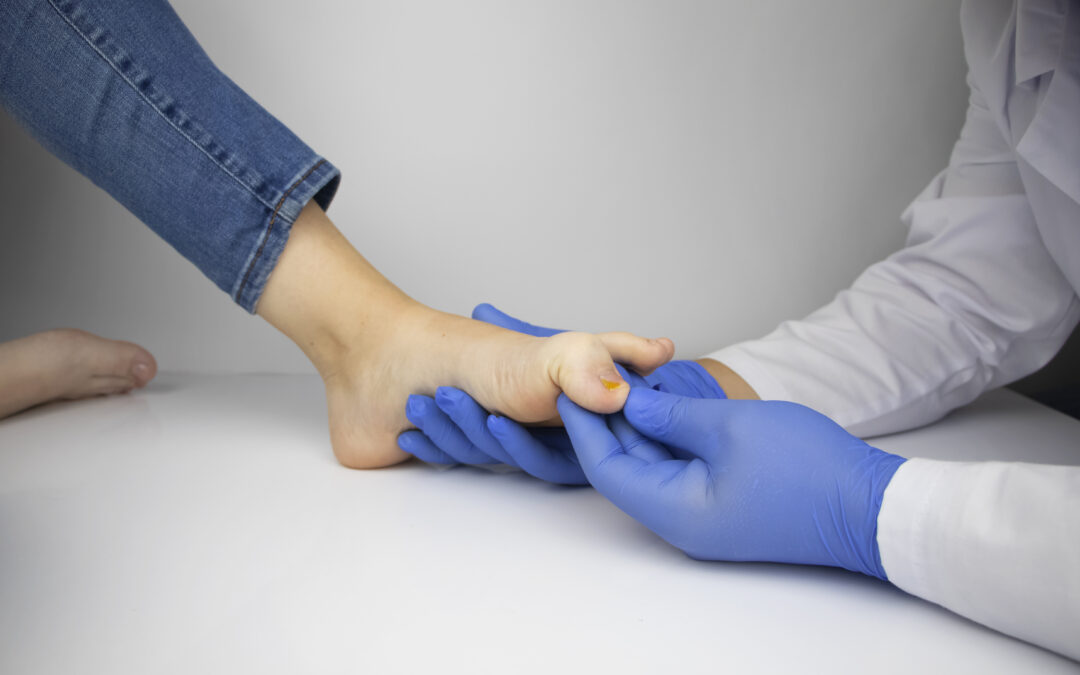Understanding the Link Between Diabetes and Slow Wound Healing
Diabetes, a condition where the body struggles to regulate sugar levels, can lead to prolonged wound healing times. How? The continuous presence of high blood glucose levels impacts multiple bodily systems, leading to an array of complications.
One of the primary issues with elevated glucose levels is that it can lead to arterial stiffening and blood vessel constriction. Additionally, diabetic neuropathy, a byproduct of high sugar levels, can result in nerve damage, predominantly affecting the extremities such as the legs and arms. These diabetes-induced conditions heighten the risk associated with foot ulcers and other wounds, and unfortunately, they also hinder the body’s healing mechanisms.
For residents in Baltimore and nearby regions, expert diabetic foot ulcer care is readily accessible at our numerous podiatry clinics. Our accredited podiatrists specialize in diabetic foot ulcer management, ensuring patients receive the best and safest care. It’s imperative to remember that for those with diabetes, even minor injuries like small cuts, blisters, or ingrown toenails can escalate rapidly. Conditions such as skin ulcers and calluses might compromise tissue integrity, thereby raising the likelihood of infections. Hence, prompt and effective diabetic wound care is not just recommended—it’s essential.
The Numbness Dilemma: Diabetic Neuropathy
Diabetic neuropathy presents a unique challenge for patients, stemming from the havoc high blood sugar wreaks on nerves. This nerve degradation often results in reduced pain sensitivity, especially in the limbs. With diminished sensation, patients might unintentionally neglect early signs of blisters, injuries, or infections. Such oversight can lead to complications, as unnoticed wounds can deteriorate further, complicating the healing process once they are eventually identified.
The Impact of Circulation Issues on Wound Healing in Diabetes
Effective wound healing hinges on optimal blood circulation. However, diabetes introduces obstacles in this process, as circulation issues can hinder the necessary oxygen flow to wounds. The heightened glucose levels not only impair the efficiency of red blood cells—responsible for nutrient delivery to the wound—but also compromise the capability of white blood cells to combat infections. Consequently, the healing journey faces additional hurdles. With increased blood sugar levels, the body’s defense mechanisms against infections weaken, elevating the risk of potential complications.
Navigating the Elevated Wound Risks of Diabetes
Diabetes poses an increased risk for several health complications, including foot ulcers, gangrene, sepsis, and bone infections like osteomyelitis. These foot ulcers, in particular, are susceptible to infections, often becoming chronic and leading to severe outcomes such as limb amputation.
For individuals with diabetes, proactive self-care is essential. Implementing daily self-checks for ulcers or wounds and actively managing diabetes can substantially improve the healing trajectory for any present injuries. Should you notice any signs of a developing wound, seeking prompt consultation with a podiatrist, especially one specializing in diabetic foot ulcer treatment, can make a significant difference.
For those in Baltimore and its neighboring regions, our centers offer specialized care for diabetic foot ulcers. To explore your treatment options and ensure you receive the best care, reach out to schedule an appointment at our facilities. To discuss your unique needs, you’re welcome to contact our scheduling office directly at (833) 500-3338.
Is it Time for Expert Care?
If any of the aforementioned concerns resonate with you, it’s crucial to engage with a professional. The team at MVS Podiatry Associates is here to guide you. All our doctors have board certification or qualification, emphasizing our commitment to your foot health.
Other Related Articles:
- How Do You Treat an Ulcer? 5 Methods Explained
- How to Prevent & Treat Diabetic Foot Ulcers
- What is the Impact of Diabetes in Wound Healing?
- The Key Role of a Podiatrist in Diabetic Foot Care
- 9 Healthy Tips for Diabetic Foot Care
- What is Diabetic Foot Pain?
- What Diabetic Foot Care Treatments Are Best Left to Your Podiatrist?
- Can a Podiatrist Perform Surgery? What Types?
- When to See A Podiatrist
- Everything You Need to Know About a Podiatrist
- 11 Things Every Patient Should Know About Foot Surgery





